I remember seeing Robertson Davies's books on the shelves when I was first starting to read enthusiastically: that is to say, ten or fifteen years ago. Titles of later works like
Murther and Walking Spirits, or
The Cunning Man, are familiar to me, but what I recall most vividly were the fat trilogies with Penguin-orange spines and ornate cover art.
The Salterton Trilogy. The Deptford Trilogy. The Cornish Trilogy.
Never get me reading those, I thought, not wishing to admit to being put off by their fatness and longness, and so finding a better excuse in the author's unfeasible beard. What sense could be written by a man like this?
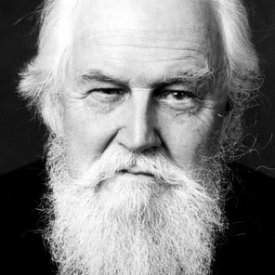
Silliness aside (although it
is a
very large beard), I've nonetheless been aware of his high standing with many people whose opinions I respect. And so when I saw that the Deptford Trilogy had been reissued in snazzy Modern Classics covers as - the deciding factor - individual volumes, I snapped up the first,
Fifth Business.
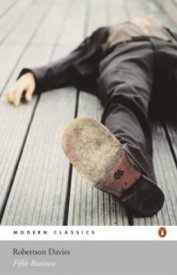
And how glad I am that I did! Not just because it's a wonderful read, but also because it affirmed my original suspicion that if I had bought the one-volume trilogy, I would never have got through it. This is because although
Fifth Business at 250 pages is not a long book, it
is more or less a long read. The reason for this came to me as I worked my way through it. We are always told that a writer should show and not tell. Let the reader discover. Of course, in a first person narrative, where the character is necessarily imparting his opinions to us directly as well as his memories of events, this rule is less hard and fast than elsewhere. And frankly, Davies doesn't give a damn for it at all. There is relatively little show in
Fifth Business: it's tell, tell, tell all the way.
Sometimes this can make for a difficult read. Saul Bellow tends to go in for telling rather than showing, and his prose (for me) clogs up and grinds to a halt somewhere between eye and brain as a result. There is no breathing space. The other feature of telling is that information is imparted much more densely than when showing. To give an entirely fatuous example - for which I apologise in advance, but it was apposite for me - I realised this very clearly when writing part of a story myself last week. I had a bit of information and plot development to impart, and so I just wrote it down in a third person narrative:
this happened then this happened and so that came about. It took about six to eight lines. Then I remembered to show not tell, and decided to rewrite it as a scene between two characters where the events I had described actually took place. This way, it was easier to read but lasted much longer: 40 to 50 lines.
And so I realised that as Davies (or his narrator, Dunstable/Dunstan Ramsay, retired teacher and hagiographer) tells us most things rather than showing them, he doesn't half get a lot of information onto one page. So after a three- or four-page chapter you feel you've read a dozen or more pages. And the book itself, at 250 pages, has the depth, range, scope and richness of a 600-page epic. (And three volumes in one, rather than feeling like your average 800-page thumper, would feel like a couple of
Suitable Boys.) Davies's extraordinary achievement is to make the book avidly readable and utterly compelling (well, OK, apart from some of the saint-stuff) in a way that it really oughtn't to be, at least judging by the likes of Bellow. The prose just flows beautifully, and the early and later chapters in particular - Ramsay's childhood and youth, and his time from meeting the illusionist Magnus Eisengrim onward - are gripping, delicious and so far as I could see, flawless. His way of dealing information to the reader so as to seem serene, wise and utterly trustworthy even in the midst of strange happenings reminded me in a way of Alasdair Gray and Russell Hoban, both of whom, perhaps not coincidentally, also sport beards, though much inferior to the Davies model.
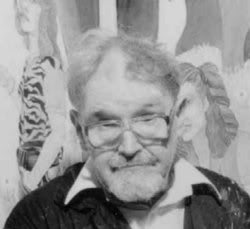 Graybeard
Graybeard
 Hobeard
Hobeard
He shares too their subtle wit, where there is an undercurrent of amusement even when nothing specifically comic is happening (though I did enjoy the positively Wildean quip: "She's been kissed oftener than a police-court Bible, and by approximately the same class of people"). And his ability to sketch a character in a paragraph is delightful.
Milo was our school buffoon, the son of Myron Papple, the village barber. Barbers in more sophisticated communities are sometimes men with rich heads of hair, or men who have given a special elegance to a bald head, but Myron Papple had no such outward grace. He was a short, fat, pear-shaped man with the complexion and hair of a pig of the Chester White breed. He had but one distinction; he put five sticks of gum in his mouth every morning and chewed the wad until he closed his shop in the evening, breathing peppermint on each customer as he shaved, clipped and talked.
The book has been compared by some reviewers with
A Prayer for Owen Meany, and you can see why: the snowball/baseball firing off a series of events, the stifling smalltown life, the religious content. But
Fifth Business is in its way odder and more magical than
Owen Meany, albeit less of a crowd-pleaser. I have since picked up the second and third volumes in the trilogy,
The Manticore and
World of Wonders. Given the essence of something vaguely magical (but not vulgarly otherworldly) which sprinkles the text, I can't help wondering if the new covers of the British/Canadian editions won't lose something of the books in their dryness, certainly compared with the slightly richer and more colourful new US editions out next year. But really, as long as the fiction itself holds up, I'll be well pleased.
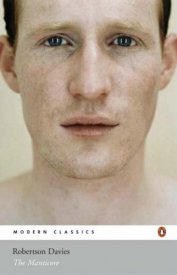
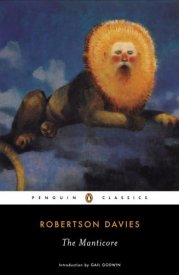
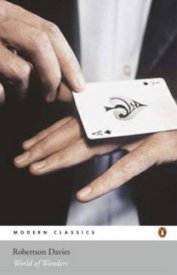
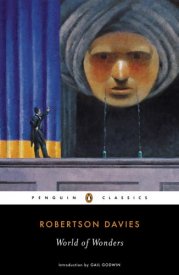










 Had to throw in another Canadian.
Had to throw in another Canadian. 
